
President Donald Trump has issued a fiery note to Federal Reserve Chair Jerome Powell, accusing him of costing the U.S. economy "a fortune" by keeping interest rates artificially high.
The strong message, delivered through White House Press Secretary Karoline Leavitt, comes as Trump continues to criticize Powell’s refusal to lower interest rates, which he believes are holding back the U.S. economy from reaching its full potential.
In the note, Trump lays out his case that the Federal Reserve's current target rate of 4.25% to 4.5% is harming the U.S. economy, while other countries around the world benefit from significantly lower rates. Leavitt, in her briefing to the press on Monday, read the note aloud, highlighting Trump’s frustration with Powell’s leadership at the Fed.
"Jerome, you are, as usual, too late. You have cost the USA a fortune and continue to do so," Leavitt quoted from Trump’s note. "You should lower the rate by a lot. Hundreds of billions of dollars are being lost and there is no inflation."
Trump’s criticism is based on a chart he sent to Powell, showing how other countries — including economic powerhouses like Switzerland, Japan, and Canada — have lower interest rates than the United States.
According to the chart, nations such as Botswana, Cambodia, Denmark, Thailand, and many others have managed to maintain lower rates, while the U.S. continues to face the burden of high interest rates.
Leavitt displayed the chart during her briefing, listing countries like Switzerland (with an interest rate of only 0.25%), Japan, Denmark, Thailand, Botswana, Barbados, and many others, all of which have more favorable rates compared to the U.S.
"These countries are paying lower interest rates than the United States of America, which has one of the hottest and strongest economies in the world," Leavitt said, underscoring the disparity.
Trump has been vocal in his belief that interest rates should be much lower, arguing that such a move would provide a significant boost to the economy.
In recent interviews, the president has continued to push for rates to be slashed to "1% or 2%" — levels that he believes would allow American businesses to flourish and lead to stronger economic growth.
The president has long argued that the Fed’s rate hikes are a mistake, particularly as the U.S. economy continues to show strength. Trump’s frustration with Powell is rooted in his belief that the U.S. is being unnecessarily burdened by high interest rates while other nations benefit from more favorable conditions. With inflation not being a major concern, Trump believes that there is no justification for keeping rates high.
In a Sunday interview with Fox News' Maria Bartiromo, Trump again hammered Powell, calling him a "bad Fed chairman" and suggesting that his decisions have hurt the U.S. economy.
"We have a bad Fed chairman, but other than that... it doesn't even matter, the numbers are so good it doesn't matter that he keeps the rates artificially high," Trump said, once again emphasizing his belief that Powell’s policies are holding back the nation’s potential.
The Federal Reserve, as the central bank of the United States, operates independently from the president and Congress. This independence means that Powell is not beholden to any political figure, including Trump.
However, Trump’s public criticisms highlight the ongoing tension between the administration and the central bank. Powell, appointed by Trump in 2017, has faced mounting pressure from the president in recent months as the economy continues to perform well but interest rates remain high.
Trump’s public comments have become increasingly pointed, with the president labeling Powell "Mr. Too Late" and accusing him of making mistakes that have cost the U.S. economy dearly.
At a recent NATO summit in Canada, Trump went even further, calling Powell "terrible" and suggesting that he lacked the mental acuity needed for the job. "He’s a very average mentally person," Trump said, adding that Powell had a "low IQ for what he does."
Despite these criticisms, Powell has resisted calls to lower rates. In June, Powell testified before Congress, explaining that he was holding off on rate cuts to better assess the impact of tariffs and trade policies.
The Fed's decision to keep rates steady for its fourth consecutive meeting in June was met with mixed reactions, with Trump and many conservatives pushing for more aggressive action to lower borrowing costs.
Trump’s criticism of Powell is rooted in the idea that high interest rates are stifling economic growth. Higher rates make borrowing more expensive, which can slow down business investment, reduce consumer spending, and dampen the housing market. In a time of economic strength, Trump believes that lower rates would encourage more investment and stimulate economic activity.
One of the key points Trump and his supporters emphasize is that inflation is not currently a significant concern. The president has argued that there is no real reason to keep rates at such high levels when inflation is under control and the economy is performing well. Lowering rates, he believes, would be a simple way to give the economy a boost without risking runaway inflation.
Trump’s argument is bolstered by the fact that many other countries around the world, including some of the strongest economies, are paying far lower interest rates.
By comparison, the U.S. appears to be an outlier, with much higher rates that could be seen as unnecessary given the current economic conditions. Trump’s frustration is clear: while the U.S. economy is thriving, it is being held back by an unnecessarily restrictive monetary policy.
For Powell, the decision to keep rates steady is part of a broader strategy to ensure that inflation does not rise out of control. While Trump and his supporters argue that the economy is strong enough to handle lower rates, Powell is focused on the potential risks that come with cutting rates too quickly. By resisting calls to lower rates, Powell is adhering to the Fed’s primary goal of maintaining price stability and avoiding excessive inflation.
However, Trump has made it clear that he does not share Powell’s cautious approach. For the president, the economy’s strong performance and the absence of significant inflation are clear signals that the Fed should act more aggressively.
Trump’s continued public pressure on Powell has led some observers to question the independence of the Fed, especially as the president pushes for a more politically aligned approach to monetary policy.
Leavitt, during her press briefing, was asked why Trump does not simply remove Powell and appoint a new Fed chairman who would be more in line with his policies. "It’s a good question and one you can ask the president because that’s a decision for him to make," Leavitt responded. "But you’re right to point out the politicization of the Fed. And it’s very unfortunate for our country."
Leavitt went on to note that Powell had previously cut rates multiple times before the 2020 election when Joe Biden was in the Oval Office. However, she argued that Powell now refuses to cut rates even though the economy is in a much better place.
Despite the ongoing tension between Trump and Powell, the current Fed chair’s term is set to end in 2026. Trump has previously indicated that he is already vetting potential candidates to replace Powell, mentioning that he is considering "three or four" individuals for the job.
The prospect of a new Fed chairman could be a key issue in the 2024 election, as Trump’s economic vision, particularly on interest rates, will play a central role in his platform.
In the meantime, the debate over interest rates continues to simmer. With Powell at the helm, the Fed is likely to maintain its cautious approach, while Trump and his supporters continue to call for bolder action to lower rates and stimulate the economy.
The outcome of this ongoing battle will have significant implications for the future of U.S. economic policy and the role of the Federal Reserve in shaping it.
As Trump remains vocal in his criticism of Powell, the pressure is mounting on the Fed to address the concerns raised by the president and his supporters.
Whether Powell will ultimately respond to these calls for lower rates remains to be seen, but one thing is clear: the battle over interest rates is far from over, and it will continue to be a key issue in the months and years ahead.







